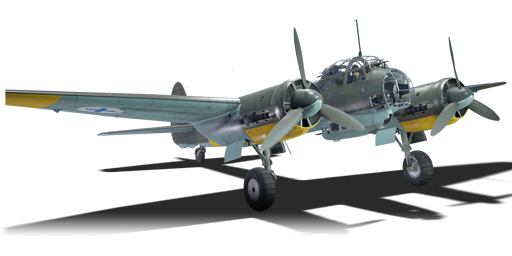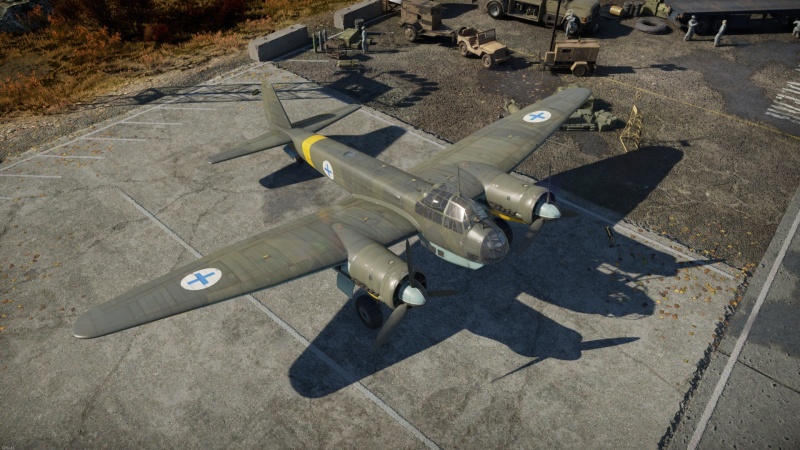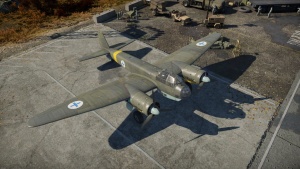Difference between revisions of "Ju 88 A-4 (Sweden)"
(image) (Tag: Visual edit) |
Colok76286 (talk | contribs) (Undo revision 146952 by U134540612 (talk)) |
||
| Line 162: | Line 162: | ||
== Media == | == Media == | ||
| − | < | + | <!-- ''Excellent additions to the article would be video guides, screenshots from the game, and photos.'' -->[[File:GarageImage Ju 88 A-4 (Sweden).jpg|left|thumb|In the Hangar.]] |
| − | File:GarageImage Ju 88 A-4 (Sweden).jpg|In the Hangar | ||
| − | |||
== See also == | == See also == | ||
| Line 179: | Line 177: | ||
* ''topic on the official game forum;'' | * ''topic on the official game forum;'' | ||
* ''other literature.'' --> | * ''other literature.'' --> | ||
| − | |||
* https://en.wikipedia.org/wiki/Junkers_Ju_88 | * https://en.wikipedia.org/wiki/Junkers_Ju_88 | ||
{{AirManufacturer Junkers}} | {{AirManufacturer Junkers}} | ||
{{Sweden bombers}} | {{Sweden bombers}} | ||
Revision as of 13:08, 1 December 2022
Contents
Description
The ▄Ju 88 A-4 is a rank II Swedish bomber with a battle rating of 3.0 (AB/RB) and 2.7 (SB). It was introduced in Update "Fire and Ice".
General info
Flight performance
| Characteristics | Max speed (km/h at 5,600 m) |
Max altitude (metres) |
Turn time (seconds) |
Rate of climb (metres/second) |
Take-off run (metres) | |||
|---|---|---|---|---|---|---|---|---|
| AB | RB | AB | RB | AB | RB | |||
| Stock | 432 | 416 | 9800 | 31.4 | 32.7 | 4.2 | 4.2 | 530 |
| Upgraded | 479 | 455 | 28.7 | 30.0 | 10.2 | 6.8 | ||
Details
| Features | ||||
|---|---|---|---|---|
| Combat flaps | Take-off flaps | Landing flaps | Air brakes | Arrestor gear |
| ✓ | ✓ | ✓ | ✓ | X |
| Limits | ||||||
|---|---|---|---|---|---|---|
| Wings (km/h) | Gear (km/h) | Flaps (km/h) | Max Static G | |||
| Combat | Take-off | Landing | + | - | ||
| 0 | 310 | 457 | 428 | 280 | ~8 | ~8 |
| Optimal velocities (km/h) | |||
|---|---|---|---|
| Ailerons | Rudder | Elevators | Radiator |
| < 350 | < 360 | < 370 | > 330 |
Survivability and armour
- 58 mm and 60 mm Bulletproof glass around the dorsal turret
- 12 mm Steel plate behind the pilot
- 12 mm Steel plates around the ventral turret
- 20 mm Steel plate behind the cockpit
Modifications and economy
Armaments
Offensive armament
The Ju 88 A-4 (Sweden) is armed with:
- 1 x 7.92 mm MG 81 machine gun, nose-mounted (750 rpg)
Suspended armament
The Ju 88 A-4 (Sweden) can be outfitted with the following ordnance:
- 10 x 50 kg SC50JA bombs (500 kg total)
- 28 x 50 kg SC50JA bombs (1,400 kg total)
- 4 x 250 kg SC250JA bombs (1,000 kg total)
- 4 x 250 kg SC250JA bombs + 10 x 50 kg SC50JA bombs (1,500 kg total)
- 4 x 250 kg SC250JA bombs + 28 x 50 kg SC50JA bombs (2,400 kg total)
- 2 x 500 kg SC500K bombs (1,000 kg total)
- 2 x 500 kg SC500K bombs + 10 x 50 kg SC50JA bombs (1,500 kg total)
- 2 x 500 kg SC500K bombs + 28 x 50 kg SC50JA bombs (2,400 kg total)
- 1 x 500 kg SC500K bomb + 1 x 1,000 kg SC1000L2 bomb (1,500 kg total)
Defensive armament
The Ju 88 A-4 (Sweden) is defended by:
- 2 x 7.92 mm MG 81 machine guns, dorsal turret (1,000 rpg = 2,000 total)
- 2 x 7.92 mm MG 81 machine guns, ventral turret (900 rpg = 1,800 total)
Usage in battles
The Finnish Ju 88 A-4 works just like its German counterpart, being able to both dive bomb and do horizontal bombing. The bomber has decent defensive armament and has a single offensive 7.92 mm MG 81 machine gun, which unfortunately won't really come in handy. You are able to carry up to 2,400 kg of bombs with this plane, making it a formidable bomber.
Air Battles:
In Air battles you should either bring the SC50 x28, SC500 x2 payload or the SC50 x28, SC250 x4 payload as they fully use the Ju 88 A-4's potential and will do a great job at damaging enemy bases, airfields and even ground targets. As soon as you spawn in, start climbing to make sure you are safe from enemy fighters. The greatest threats to you will be the German Bf 109s with their astonishing climb rate, so remember to always check your surroundings.
Ground Battles:
In Ground battles you should ignore the 50 kg bombs as they won't do much against tanks and will only add weight to your plane, instead, bring 250 kg bombs, 500 kg bombs or the 1,000 kg bomb, these payloads won't use the Ju 88 A-4's full bomb capacity but they will make it more manoeuvrable and faster. Additionally, it is easier to hit ground targets with dive bombing tactics, so when you approach your target, extend the airbrakes ("H" by default) and reduce throttle if necessary to avoid too much speed which could result in your wings being ripped off.
Facing the Ju 88 A-4:
If you come across a Junkers 88 A-4, you will either be facing its cockpit or its tail most of the time. Attacking the bomber from below is also an option as it does not have any ventral gunners aiming down. If you are facing its cockpit, aim for the pilot as this will cause the plane to instantly be destroyed. If you are facing its tail, however, be carefull with the gunners and aim for the engines, bombers won't go far without them. Since the Ju 88 A-4 gets a bomber spawn, it is recommended to use planes with good climb rates, such as the aforementioned Bf 109s.
Pros and cons
Pros:
- Excellent payload options
- Capable of dive bombing
- The 28 x 50 kg bombs are effective against light vehicle columns
- Fast-firing defensive armament
- Fast for a bomber aircraft
Cons:
- Limited offensive armament
- No ventral gunners aiming down, making it vulnerable to attacks from below
History
The Junkers Ju 88 is a German World War II Luftwaffe twin-engined multirole combat aircraft. Junkers Aircraft and Motor Works (JFM) designed the plane in the mid-1930s as a so-called Schnellbomber ("fast bomber") that would be too fast for fighters of its era to intercept. It suffered from technical problems during its development and early operational periods but became one of the most versatile combat aircraft of the war. Like a number of other Luftwaffe bombers, it served as a bomber, dive bomber, night fighter, torpedo bomber, reconnaissance aircraft, heavy fighter and at the end of the war, as a flying bomb.
In April 1943, as Finland was fighting its Continuation War against the USSR, the Finnish Air Force bought 24 Ju 88s from Germany. The aircraft were used to equip No. 44 Sqn, which had previously operated Bristol Blenheims, but these were instead transferred to No. 42 Sqn. Due to the complexity of the Ju 88, the FAF spent most of 1943 training crews on the aircraft, and conducted only a handful of bombing missions. The most notable was a raid on the Lehto partisan village on 20 August 1943 (in which the whole squadron participated), and a raid on the Lavansaari air field (leaving seven Ju 88 damaged from forced landing in inclement weather). In the summer of 1943, the Finns noted stress damage on the wings. This had occurred when the aircraft were used in dive bombing. Restrictions followed: the dive brakes were removed and it was only allowed to dive at a 45-degree angle (compared to 60–80 degrees previously). In this way, they tried to spare the aircraft from unnecessary wear.
One of the more remarkable missions was a bombing raid on 9 March 1944 against Soviet Long Range Aviation bases near Leningrad, when the Finnish aircraft, including Ju 88s, followed Soviet bombers returning from a night raid on Tallinn, catching the Soviets unprepared and destroying many Soviet bombers and their fuel reserves, and a raid against the Aerosan base at Petsnajoki on 22 March 1944. The whole bomber regiment took part in the defence against the Soviets during the fourth strategic offensive. All aircraft flew several missions per day, day and night, when the weather permitted.
No. 44 Sqn was subordinated Lentoryhmä Sarko during the Lapland War (now against Germany), and the Ju 88s were used both for reconnaissance and bombing. The targets were mostly vehicle columns. Reconnaissance flights were also made over northern Norway. The last war mission was flown on 4 April 1945.
After the wars, Finland was prohibited from using bomber aircraft with internal bomb stores. Consequently, the Finnish Ju 88s were used for training until 1948. The aircraft were then scrapped over the following years. No Finnish Ju 88s have survived, but an engine is on display at the Central Finland Aviation Museum, and the frame structure of a German Ju 88 cockpit hood is preserved at the Finnish Aviation Museum in Vantaa.
Media
See also
Similar aircraft:
External links
| Junkers Aircraft and Motor Works (Junkers Flugzeug- und Motorenwerke Aktiengesellschaft) | |
|---|---|
| Fighters | Ju 88 C-6 · Ju 388 J |
| Strike Aircraft | |
| Ju 87 | Ju 87 G-1 · Ju 87 G-2 |
| Bombers | Ju 88 A-1 · Ju 88 A-4 · Ju 188 A-2 · Ju 288 C |
| Ju 87 | Ju 87 B-2 · Ju 87 D-3 · Ju 87 D-5 · Ju 87 R-2 · Ju 87 R-2 Libya |
| Export | ▄Ju 87 D-3 · ▄Ju 87 R-2 · ▄Ju 88 A-4 |
| Sweden bombers | |
|---|---|
| B3 | B3C |
| B17 | B17A · B17B · S17BS |
| SAAB 18 | B18A · B18B · T18B · T18B (57) |
| T 2 | T 2 |
| Finland | ▄Ar 196 A-5 · ▄Ju 88 A-4 |






